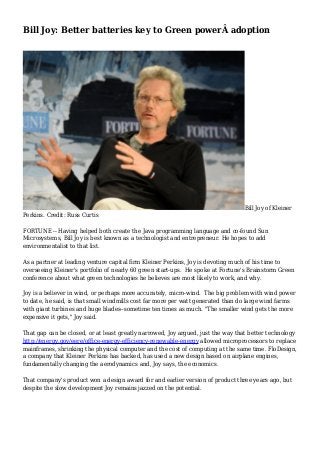
Bill Joy: Better batteries key to Green power adoption
- 1. Bill Joy: Better batteries key to Green power adoption Bill Joy of Kleiner Perkins. Credit: Russ Curtis FORTUNE -- Having helped both create the Java programming language and co-found Sun Microsystems, Bill Joy is best known as a technologist and entrepreneur. He hopes to add environmentalist to that list. As a partner at leading venture capital firm Kleiner Perkins, Joy is devoting much of his time to overseeing Kleiner's portfolio of nearly 60 green start-ups. He spoke at Fortune's Brainstorm Green conference about what green technologies he believes are most likely to work, and why. Joy is a believer in wind, or perhaps more accurately, micro-wind. The big problem with wind power to date, he said, is that small windmills cost far more per watt generated than do large wind farms with giant turbines and huge blades--sometime ten times as much. "The smaller wind gets the more expensive it gets," Joy said. That gap can be closed, or at least greatly narrowed, Joy argued, just the way that better technology http://energy.gov/eere/office-energy-efficiency-renewable-energy allowed microprocessors to replace mainframes, shrinking the physical computer and the cost of computing at the same time. FloDesign, a company that Kleiner Perkins has backed, has used a new design based on airplane engines, fundamentally changing the aerodynamics and, Joy says, the economics. That company's product won a design award for and earlier version of product three years ago, but despite the slow development Joy remains jazzed on the potential.
- 2. A pair of Joy's other green goals: "The ability to store and retrieve electrons at low cost [and] the ability to make them distributed and cheap." If consumers can generate cheaper wind or solar power on their own property, he said, the next key will be matching that power with when it's actually needed. That means better batteries. "The grid moves things in space, batteries move things in time," Joy said. Again the problem is scale. Systems to store green power by pumping water uphill then releasing it to generate power when its needed work in industrial settings, but not in a private home. Joy sees a few different viable options for personal power storage. The first small-scale option is using compressed air to store and release wind energy advantages power, Joy said. Another: build a cheaper twist on today's lithium ion batteries. The trick, he says, is building slightly larger batteries than you'd find in a laptop and using water as the electrolyte. One green disappointment for Joy: a failure to build a breakthrough desalination process that could cheaply turn seawater into drinking water. The stumbling block he said, is that there so far has been no way around using heat to power the process. "Anybody who's worked with hot salt water knows how corrosive and nasty a thing it is." Joy is still optimistic about water purification technology. With the desalination dream on hold, he has devoted more effort to reclaiming "used" water, which might come with more bacteria than sea water, but doesn't have all the nasty salt. More from Fortune: